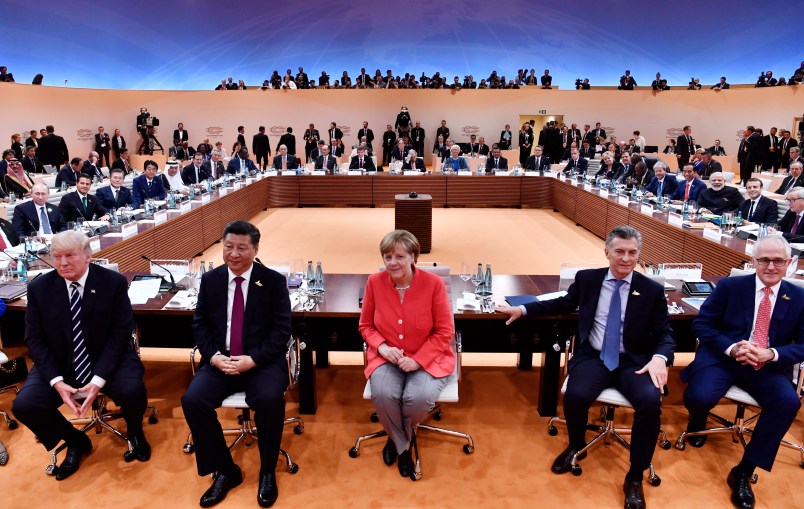HAMBURG, Germany (AP) — Talks on global trade at the Group of 20 summit proved very difficult and differences on climate change also were clear, German Chancellor Angela Merkel said Friday, as police and protesters clashed throughout the day in the summit’s host city of Hamburg.
Merkel told leaders of the G-20 economic powers that they must be prepared to make compromises as she worked toward a summit outcome that everyone present could accept.
That is a challenging task at a time when President Donald Trump’s Trump’s “America First” rhetoric and decision last month to withdraw from the Paris accord against climate change have caused widespread concern.
Negotiators “still have a great deal of work ahead of them” to formulate a passage on trade in the summit’s closing communique, Merkel said after the first day of meetings.
She added that most participants called for “free but also fair trade” and underlined the significance of the World Trade Organization, though she didn’t specify which ones did not support the trade language.
“The discussions are very difficult, I don’t want to talk around that,” Merkel said.
The German leader said most summit participants backed the Paris climate accord. Speaking separately, French President Emmanuel Macron spoke of “the common engagement which we must take, we must defend, at a moment when it is called in question by certain people.”
“It will be very interesting to see how we formulate the communique tomorrow and make clear that, of course, there are different opinions in this area because the United States of America regrettably … wants to withdraw from the Paris accord,” Merkel said.
Germany has been keen to preserve the G-20’s tradition of making decisions by consensus. Merkel has rejected calls from some to push for a strong “G-19” statement — without the U.S. — on climate change.
Opening discussions earlier in the day, Merkel told fellow leaders that there are “millions of people following us with their concerns, their fears and their needs, who hope that we can make a contribution to solving the problems.”
“We all know the big global challenges, and we know that time is pressing,” she said. “So solutions can only be found if we are prepared to compromise … without, and I say this clearly, bending ourselves too much out of shape. We can of course also name differences.”
The leaders did make a joint statement on fighting terrorism, an issue on which there are few differences. They called for ensuring that there are “no ‘safe spaces’ for terrorist financing anywhere in the world” and pledged to work with internet providers and app administrators to combat the web’s use for terror propaganda and financing.
Merkel noted that the countries at the summit represent two-thirds of the world’s population, four-fifths of the globe’s gross domestic product and three-quarters of world trade.
The G-20 comprises Argentina, Australia, Brazil, China, Germany, France, Britain, India, Indonesia, Italy, Japan, Canada, South Korea, Mexico, Russia, Saudi Arabia, South Africa, Turkey, the United States and the European Union.
Also attending are the Netherlands, Norway, Spain, Guinea, Senegal, Singapore and Vietnam.
Merkel said the threat posed by North Korea’s missile tests was brought up at Friday’s meetings by the leaders of South Korea and other countries in the region, and all hoped that “the U.N. Security Council will find an appropriate answer” to Pyongyang’s violation of U.N. resolutions.
The summit was also a forum for a flurry of bilateral meetings, including Trump’s first encounter with Russian President Vladimir Putin.
Outside the security cordon around the downtown congress center, anti-globalization activists set dozens of cars ablaze and tried unsuccessfully to block national delegations from entering the summit.
The city already had boosted its police with reinforcements from around the country and had 20,000 officers on hand to patrol Hamburg’s streets, skies and waterways. Another 900 were called in to cope with the clashes.
Merkel thanked them for their work.
“I have every understanding for peaceful demonstrations,” she said. “But violent demonstrations endanger human lives, they endanger people themselves, they put police officers and security forces in danger, put residents in danger, and so that is unacceptable.”







Presidentin’ is hard when you’re not fluent in Russian…
Or English.
The G-19 vs DJT. Difficult.
As soon as all the world’s powers learn that Trumpie boy only does bi-lateral deals (give Him His Scooby Steak first), they can take turns taking the US for what it’s worth :smh: